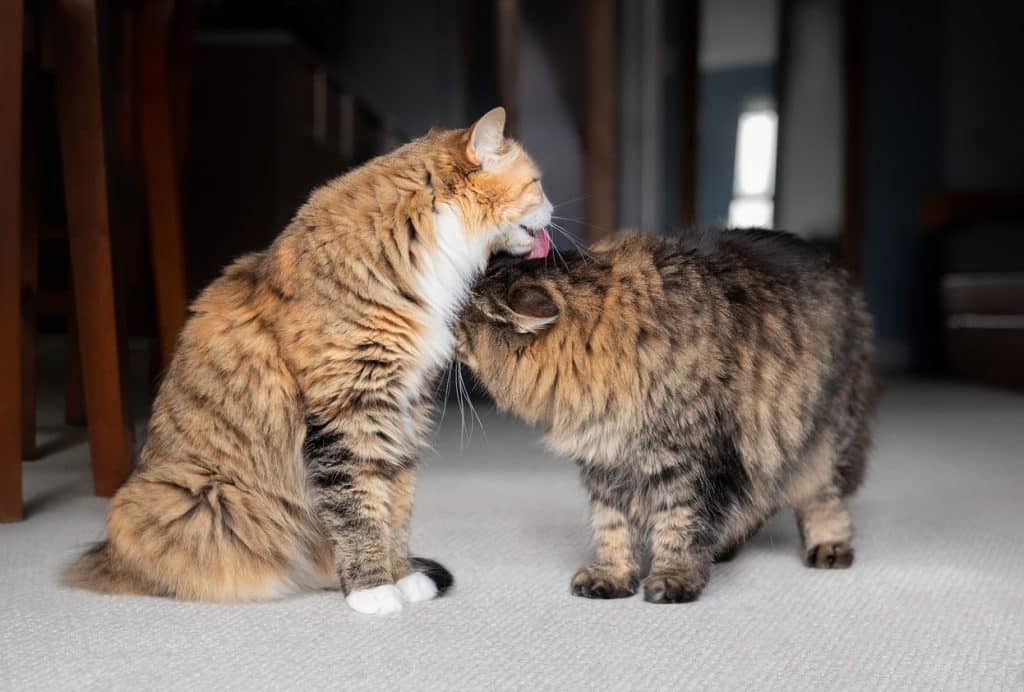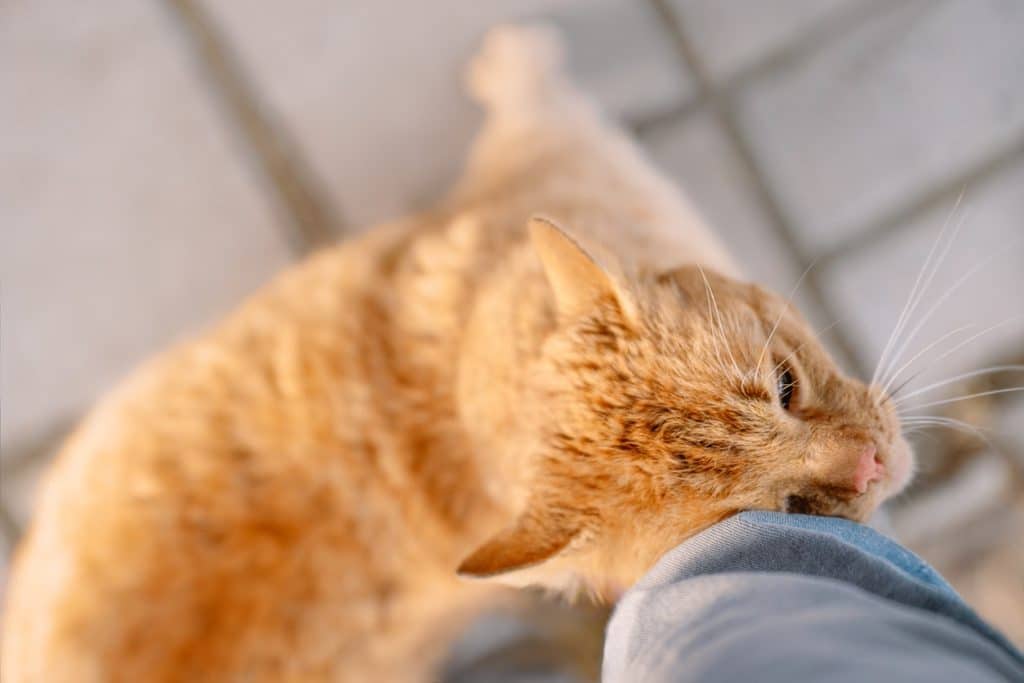If you notice your cat adorably rubbing their face on everything (including you) without hesitation, there’s no need to worry—that’s just one of your cat’s many adorable and quirky behaviours. This behaviour, bunting, is one of the many ways cats communicate with their cat parents and feline friends. Cats often rub their face on you to leave their scent or get your attention.
We’ll walk you through nine reasons your cat seems to rub their face on everything. Then, discover more cues and information about cat language to understand your kitty better.
9 Reasons Your Cat Rubs You
Cats are incredibly curious, but that isn’t the only reason they rub their face on everything in sight. Your cat may rub their face on everything for the following reasons.
They’re leaving their scent on you
Cats have scent glands on their cheeks, chin, and head. So, when they’re rubbing up against you and your belongings, they claim you and those items as theirs with their scent.
“When cats rub their head on a person or an object, they are leaving behind pheromones from the glands in the head and face,” says author Zazie Todd, PhD, a psychologist specialising in pet behaviour. “Those pheromones can then be detected by them—or other cats—at that time or later.” She explains that experts know of five pheromones that can be deposited when cats rub: F1, F2, F3, F4, and F5.
While more research is needed on these pheromones, experts are sure of the following:
- Male cats tend to mark more than female cats
- The functions of F1 and F5 are unknown
- F2 is for male mate display and may improve the effectiveness of their sexual display
- F3 is for cats to mark objects and areas they know
- F4 is to mark humans and other animals
They’re communicating with other cats
Cue the ‘aws’! Seeing two cats affectionately butt each other’s heads is not only one of the cutest sights, but interestingly enough, it’s them transferring messages to one another and is one of several ways cats communicate with each other.
“When a cat rubs their head on another cat, we think they are doing this to create a group scent that shows that they are friends,” Dr Todd says. “Sometimes, they will rub not just their head, but also the whole body and even wrap their tails together.” She adds that this involves the F4 pheromone.

iStock/Petra Richli
They’re looking for a mate
You might notice your cat rubbing more than usual if love is in the air. Todd says male cats will deposit the F2 pheromone on objects when a female cat’s in heat. However, she says more research is needed to learn about the role of pheromones in looking for a mate.
They’re making themselves at home
When you become a cat parent, there’s an unspoken rule that what’s yours becomes your cat’s. Bunting further reinforces this.
“Cats will rub their head on objects within their territory,” Todd explains. “They are leaving pheromones behind, and this will help them to feel more comfortable.” She adds that cats who are friends and share a home may head rub on the same surfaces.
They have cat anxiety
Sometimes, constant signs of affection, such as rubbing and cuddling, paired with an unwavering need for attention, may indicate separation anxiety in your cat. Bunting may also signify they’re trying to reduce feelings of distress and make them feel more at ease.
They’re showing their love
As cat parents, we can’t help but wonder if our cats love us. If your cat rubs their head on you, Todd says it’s their way of showing you that you’re a trusted friend and companion.
Cats might also purr when they rub their face against yours, which can be interpreted as: “I love you…for now.”
They’re trying to get your attention
Todd says if your cat comes and rubs their head on you, they might be searching for pets (on their terms).
In other cases, they might rub against you to ask for tasty cat treats. Either way, bunting might indicate they crave something and want you to give it to them.

iStock/Adriana Duduleanu
They’re picking up information
While cats rub to deposit information through pheromones, this behaviour could also mean they’re trying to pick up another cat’s scent, which could be the case if you have a multi-cat household.
They’re greeting you and your guests
Nothing feels better than when cats rub themselves against our legs or bunt us after a long day to welcome us back. Todd says this can be a friendly greeting from our cats.
Cats might also rub against guests if they’re familiar with them to indicate some level of trust.
Should You Worry If Your Cat Is Rubbing Against Things All the Time?
There’s usually no need to worry if your cat constantly rubs against everything, as it’s completely normal. What appears as face-rubbing can be your cat overgrooming, trying to soothe pain, or head pressing.
Some conditions that may cause face rubbing or excessive rubbing include the following:
- allergies
- infections or injuries (in ears or mouth)
- fleas
- feline hyperesthesia syndrome
Check your cat’s ears and mouth to rule out any potential infections or injuries, and look for signs of fleas or allergies. If the excessive rubbing persists or your cat develops additional symptoms, schedule an appointment with your vet so they can conduct a wellness exam.



